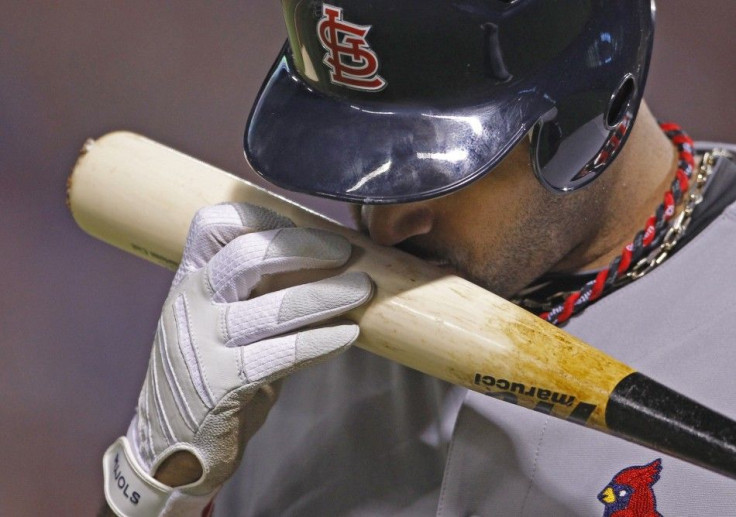Albert Pujols Contract: Cardinals' Star Could See More Money After Monster World Series Game

With Albert Pujols' contract situation and impending free agency, get ready for the litany of potential lasts for Pujols in his career as a St. Louis Cardinal. You know: Is it the last home run? Is it the last hit? Is it the last game? Is it the last swing?
Well, Tuesday night might just be Albert Pujols' last game as a Cardinal at Rangers Ballpark in Arlington, Texas. Yeah, this is starting early.
But because of Pujols' first game as a Cardinal at the Rangers Ballpark, he significantly altered the contract he'll likely get after the season.
Pujols, of course, had a night for the ages: 5-for-6, three home runs, six RBI. All of that came in the Cardinals' 16-7 victory that gave them a 2-1 series lead. After Sunday's loss, though, the Cardinals and Rangers are back to square one: Tied, 2-2, with a best-of-three series to take the 2011 World Series.
We have a pact, Cardinals manager Tony La Russa told reporters, referring to him and his players. When we put our hands together, we're not thinking about anything except the 2011 season and the postseason.
Except mostly everyone else has one eye on the future. Pujols already is in line for a contract in the neighborhood of 10 years and $200 million, and his stock only went up with the Game 3 performance. Whether or not he helps the Cardinals to another World Series Championship could take that stock even higher.
For Pujols, Saturday was a defining night. He joined names like Babe Ruth and Reggie Jackson as the only players to hit three home runs in a game. Yankee fans still talk about Jackson's magical night in the 1977 World Series, and Cardinals fans will remember Pujols' night long after Saturday.
So, ultimately, how does it affect his contract? Some comparable situations and things to consider:
- Four years later, Alex Rodriguez still owns the largest contract in major-league history. In 2007, at 32, Rodriguez signed a 10-year, $275 million contract just months after opting out and alienating himself from the Yankees organization. You can imagine this working both for and against Pujols.
On one hand, Pujols' career to this point has been even more impressive than Rodriguez's was when he opted out of his contract four years ago. He sports a significantly better batting average, OPS and strikeout-to-walk ratio in comparison. Rodriguez was also coming off another poor postseason performance.
On the other hand, these were the Yankees that outbid themselves for Rodriguez. And four years later, if he is used as a benchmark, and with him already in decline and injured, it looks like the contract will become an albatross sooner rather than later -- with six years left in the deal.
- Seven years ago, the Houston Astros acquired center fielder Carlos Beltran mid-season with the hopes of keeping him and signing him to a long-term deal. Then the postseason happened. Beltran hit .435 with eight homers and 14 RBI in 12 games. He signed a seven-year, $119 million contract with the Mets that the Astros could not match.
Still, the Cardinals have realized Pujols' contract situation for years now. They should be more prepared than the Astros. And Beltran, a rental, was not nearly as important to the Astros organization as Pujols has become to the Cardinals.
- Consider the Cardinals' other contracts. They have been reluctant to give out large sums of money to handfuls of players. This year, Matt Holliday makes $17 million and Pujols makes $16 million. Pitcher Chris Carpenter was paid $15 million. The next closest hitter is Lance Berkman, who makes $8 million. Are the Cardinals willing to shell out upward of $20 million a year for one player?
© Copyright IBTimes 2024. All rights reserved.





















